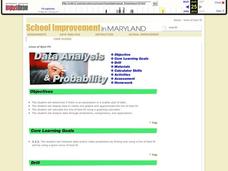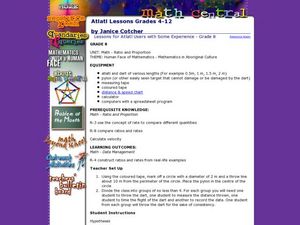Curated OER
WebQuest Solar System Colonization Project 2000
Sixth graders investigate the livability of different planets in the universe by researching and organizing information from a number of sources in this unit project. They decide on a location for a space station which they support in an...
Curated OER
Density Destiny
Sixth graders measure and investigate the densities of several objects. They, in teams, determine the mass and volume of each of the 5 objects and record the measurements in the data table.
Curated OER
High and Low Tides
Students collect real world data from the Web regarding high and low tides at various locations in the United States. They find a function which models this data and make predictions on tide levels based on the information found.
Curated OER
Millions, Billions, Trillions
Students use real-world data to compare the relative sizes of millions and billions, and exponential growth. They use the salaries of famous people such as, Michael Jordan and Bill Gates to understand this math concept.
Curated OER
Solar Kit Lesson #7 Positioning Solar Panels I: Explorations with Tracking
Students track and record data on the Sun's position in the sky and on the output of a solar panel tracking the Sun. On a second day, students graph and analyze the data to identify relationships between (1) the time of day, (2) the...
Curated OER
Lines of Best Fit
Students determine if there is an associationm in a scatter plot of data. They analyze data through predictios, comparisons, and applications. Students calculate the line of best fit using a graphing calculator. They display data in...
Curated OER
Weather or Not
Sixth graders explore weather. In this meteorology lesson, 6th graders create weather instruments and compare and contrast weather data.
Curated OER
How Can They Tell?
Pupils compare the characteristics of arcade tokens to those of a circulating U.S. quarter to determine how a video game can tell the difference between the two. They examine coins and arcade tokens very closely to observe the differences.
Curated OER
Predicting Temperature: An Internet/Excel Learning Experience
Third graders use the Internet (www.weather.com) to find the high temperature for our locale and the high temperature for another city around the world. They keep track of the temperature in these two locations for 10 days.
Curated OER
Poll Positions
Students analyze and graph the results of a nationwide New York Times poll about race in the United States. They poll people in their community regarding their views and experiences, and compare and contrast local and national poll data.
Curated OER
Discovering Planet X
Students investigate the movements of the planet Pluto. Students participate in a hands-on activity to record data similar to the movements of the planet Pluto. Students compare their data to that found on a website.
Curated OER
Finding Caterpillars
Pupils examine how animals protect themselves from predators and camouflage themselves. They participate in a simulation in which they locate red and green yarn "caterpillars," organize their data, and generate a bar graph using...
Curated OER
Atlatl Lessons for Grade 8
Eighth graders explore the weapons of the Aboriginal people. In this eight grade math/science instructional activity, 8th graders collect and analyze data regarding the speed and distance of a dart thrown with an atlatl. Students...
Curated OER
Force and Gliders
Students explore physics by creating data graphs in class. In this flight properties lesson, students read the book Flying Machine and identify the force, resistance and construction necessary to keep a glider in the air. Students...
Curated OER
Fibers Lesson Plan
Students explain how to use a light microscope, describe how to care for a microscope, and solve a forensic science problem, using a microscope to analyze data and draw conclusions.
Curated OER
Science Processes
Fifth graders observe a dry piece of bread and a damp piece of bread in two separate sealed bags that have been sitting for several days that have been labeled. The observe the mold with a hand lens and record findings in their science...
Curated OER
History of Theory of Evolution
Young scholars infer evolutionary relationships by comparing the physiological data or description. They write what they think would happen if a brown bear in the woods had an offspring that was white. Would this help the baby bear in...
Curated OER
Soil Microbiology- Nitrogen cycle
Students take a virtual trip to a Catfish Aquaculture Pond and analyze soil bacteria to determine how many nitrogen cycle bacteria are present. They graph the number of colonies present and use data to determine ammonium levels in the soil.
Curated OER
Experimenting with Pressure and Volume
Learners investigate temperature and pressure with simple laboratory equipment. They use a handheld with sensors and probes to study temperature and pressure. Students explore the nature of gases with respect to temperature and are able...
Curated OER
Whose Brain is THAT?!
Students explore various animal brains. In this animal anatomy lesson, students compare and contrast animal brains with the brain of a human. They record several characteristics in a data table for each brain they observe.
Curated OER
Solar Kit Lesson #11 Power Maximum: An Electrical Determination
Students identify and implement methods to standardize testing stations that measure solar panel output power. After collecting electrical ouptut data from several solar panels, they plot the current-voltage and power curves. Students...
Curated OER
Remote Sensing
Ninth graders participate in a variety of activities designed to reinforce the concept of light and the electromagnetic spectrum. They research and analyze data from remotely sensed images. They present their findings in a PowerPoint...
Curated OER
Counting
Second graders comprehend how to use two different kinds of graphs. They complete a worksheet with the help of the teacher and a bag of jellybeans and then another worksheet without the direction of the teacher. Students listen as the...
Noyce Foundation
Boxes
Teach your class to think outside the box. Scholars use the concept of equality to solve a problem in the assessment task. They determine how to use a scale to identify the one box out of a set of nine boxes that is heavier than the others.

























